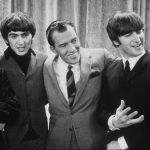Alfred Hawthorne Benny Hill was an English comedian best known for The Benny Hill Show. He ruled British television for almost four decades and was one of the most popular TV comic artists of his time. His show was one of the most-watched programs in the UK and at one point, The Benny Hill Show reached audiences in 97 countries. However, Benny’s life wasn’t as great as his career, especially towards the end so let’s find out the Death Of Benny Hill.
Facts Verse Presents The Rise, Fall, and Lonely Death of Benny Hill. Before we tell you about the life of this awe-inspiring comedian, we want to remind you to like and subscribe to our channel and press the bell icon to stay updated about all our latest videos.
In the summer of 1940, Alfred Hawthorne Hill sold his drum for £6 and bought a ticket on a train from Southampton to Waterloo. At the time, he was just 17 and had only one dream: to become a successful comedian. He was not new to the entertainment world – he had grown up seeing his father and grandfather work as circus clowns, making hundreds of people smile each day.
Though he had come to town with the addresses of three different variety theatres, luck was on his side and a complete stranger offered him a job. While working at Chelsea Palace, Alfred pulled strings to get a meeting arranged with Harry Benet at his Beak Street office. Benet offered Alfred Hill the position of Assistant Stage Manager and a salary of £3 per week. More importantly, he offered Hill a small part in a new revue called Follow the Fan and this was the beginning of his decades-long entertainment career.
A year later, Hill was eighteen and eligible for conscription. He’s happy with where he is and enjoying his new life as a member of revue called Send Them Victorious. He, very naively, thought that by being on road, he could ignore the calls from the military. His strategy did work for a couple of months. However, in 1942, while performing at the New Theatre in Cardiff, two policemen took Alfred Hill with them. Alfred did not know how to drive. His conscription duties required him to represent himself as a driver and mechanic in the Royal Electrical and Mechanical Engineers. While in the army, Alfred learned how to drive. However, he never bought a car in his entire life.
Before we go ahead, please let us remind you to like and subscribe to our channel. Also, press the bell icon and we will keep you entertained with new fun videos every day.
Sometime in late 1945, Alfred Hill was on leave from his duties in London. While there, he decided to formally apply to become a member of the services’ touring revue called Stars in Battledress. However, he didn’t have any material to present for the audition and only 24 hours to create something from scratch. For inspiration, he decided to visit the popular Windmill Theatre located in Soho. The Windmill Theatre is the only place in London where can find comedians working on their material in broad daylight. While there, Alfred Hill had the opportunity to notice Peter Waring, a short-time comedian. Peter had a huge impact on Hill and made him believe that he, too, could do comedy.
Alfred Hill decided to change his name to Benny Hill. In his opinion, Alfred or Alfie sounded like the name of a barrow boy. More importantly, Alfred wanted to pay tribute to one of his favorite comedians, Jack Benny, through his name. He, therefore, decided to change his name to Benny Hill and as Benny Hill, he bagged two auditions at the Windmill Theatre.
In 1930, the Windmill Theatre, which was until then known as Palais de Luxe, changed ownership. Mrs. Laura Henderson, whose husband just bought the theatre, got it elaborately rebuilt and decided to call in the Windmill Theatre. She hired Van Damme as the manager. Damme was a shrewd businessman and under his management, the theatre became immensely popular. Unfortunately, Damme was not an easy man to please and therefore, both times Hill auditioned at the theatre, Damme told him he wasn’t what they needed. Actually, comedians had only a small role to play in Windmill Theatre shows. People came more for risque dancing girls than to watch comedians. So comedians who worked at the theatre often had a very hard time pleasing the audience.
In any case, the rejection from Damme came as quite a big disappointment to Hill. He, thereafter, went back to working men’s clubs around London. Back then, the agents mentioned the amount of money an artist/comedian would get for their performance by simply tapping with their finger on the artist’s shoulder. A one-finger tap meant £1 and a two-finger tap meant £2. During his initial days, Benny Hill invariably always got a one-finger-tap on his shoulder.
However, as time advanced, Benny polished his material and became more confident in his craft. In 1948, he bagged an audition for the role of Reg Varney’s straight-man in Gaytime. For the audition, Benny decided to go with an English calypso. His audition was an instant success and he got the part. Though Benny did well on stage and was beginning to get recognized, he was not a man who did not enjoy being in front of people. So it wasn’t very surprising that Benny Hill reached the peak of his career through television.
Back in the 1950s, very few people had a television — only one out of twenty households had a TV set. This was also the time when television producers were trying to entice successful artists to the medium. However, most artists were either scared of television (after all, they had built their entire career by performing and re-performing the same act year after year) or considered it to be another trend that would eventually fade away. Benny Hill, however, was smart and realized the potential that the medium had. Then, he realized that television had finally made comic writers as important as comic actors for the medium needed new material every day.
Benny Hill began creating sketches for the television — he finally had a medium where he could show his talent without being compelled to face the audiences directly. Benny submitted hundreds of his sketches to BBC. At the time, Ronald Waldman was the senior BBC executive responsible for making decisions on Benny Hill’s sketches. Not only did Waldman approve of Benny’s sketches, but he also offered him his own show. This was surprising given the fact that Ronald Waldman had once written off Benny Hill as an unfunny man.
Hi, which featured many sketches written by Benny Hill,aired on 20th August 1951. It receives by audiences. However, it was only in 1955, four years after Hi made its debut, that BBC offered Benny Hill his own show called The Benny Hill Show. The Benny Hill Show was a huge success. Roy Hudd, the famous English comedian and radio host, once observed that Benny Hill never enjoyed performing in front of live audiences, which is perhaps why he saw limited success on stage. Dennis Kirkland, the famous producer/director, reiterated Hudd’s words when he announced in an interview that performing in front of a live audience made Benny Hill nervous and sweaty.
Television, therefore, was a blessing for Hill. With his The Benny Hill Show, the comedian not only got a chance to finally showcase his talent, but he also set a benchmark for British television comedy. For the next thirty-five years, Benny Hill was the quintessential TV comedian — he ruled the medium in every way. Until 1969, his show appeared only on BBC. However, in 1969, his show moved from BBC to Thames Television and Benny Hill became an overnight global star.
The show ran successfully for many years on Thames Television. However, towards the latter half of the 1980s, The Benny Hill Show began to often draw criticism for being sexist. Benny Hill did not understand these accusations. After all, he was doing the exact same thing that he had done all his life. The problem was that Benny hadn’t changed at all; his audience had. His new audience found his sketches, which often involved scantily-clad women chasing after him, bizarre. Thus, as the years passed, these criticisms grew louder.
Thus in 1989, exactly twenty years after The Benny Hill Show first appeared on Thames Television, Benny Hill was fired from his job and his show was canceled. The way this was done was not right. Benny had just returned from Cannes Television Festival when he got an invite from John Howard Davies, the new Head of Light Entertainment. Given that his show had been on the air for twenty years, Benny assumed that Davies wanted to discuss something about the show. However, he got the greatest shock of his life when Davies told him that Thames Television has decided to cancel The Benny Hill Show. Ironically, the next year, The Benny Hill Show was broadcast in 97 countries. Unfortunately, Britain wasn’t one of them.
Benny Hill never really could get over his meeting with John Howard Davies. What made matters worse was that Hill was all alone. Though Benny had spent his entire life being surrounded by women, he never entered a proper relationship, except only once. Back in the day, people presumed Hill was dating Doris Deal, a Windmill Theatre dancer. The two would often be seen eating meals together and holding hands in public places. However, when Benny Hill told Doris Deal that he wasn’t ready for marriage, she left him. Benny Hill had also shown some interest in Annette Andre, an Australian actress. However, she politely refused his proposal.
Though there were some romantic and non-romantic relationships with women, the larger narrative was that Benny Hill was either impotent or gay and had no real interest in women. He was once asked if he was ‘queer’. Benny, who was then Alfie, was unable to understand the question and replied that he simply enjoyed his funny little ways.
After the meeting with John Howard Davies, Benny Hill sank into oblivion. He stayed in touch with very few people and was mostly alone. Three years later, Dennis Kirkland, Hill’s friend, found him dead in his apartment located close to the Thames Television Studios. By the time of his death, Hill had accumulated £7 million in cash and assets. He had last revised his will in 1961 and had included his family as the beneficiaries. However, by 1992, all his family members had passed away. Thus, all of Benny Hill’s wealth went to his nieces and nephews, who he hardly even knew.
Do you remember Benny Hill? Did you know these facts about him? If you know anything more about this British comedian, please tell us in the comments section.
Before you hit play on the next video, like and subscribe to our channel and press the bell icon to stay updated about all our latest videos.


